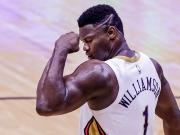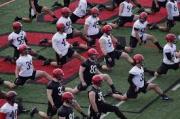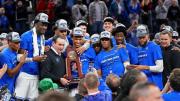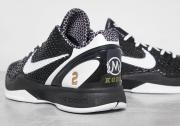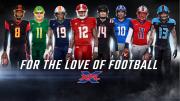Gene Therapy: Jeff Garcia vs Mina Kimes | Put Away Your Capes!
by Gene Clemons
In this country there are a lot of heroes. Some heroes are essential. Good police officers, firefighters, doctors, nurses, teachers, and many of the other nameless, faceless workers who go through life tirelessly working for the betterment and safety of others. Some heroes are unexpected. The person who rescues a kid who swam a little too far out and is not caught in the current with little to no energy left. The ones that pull you back before you walk into the street and get hit by a car because you were not paying attention. The person that opens the elevator so that you can make it on before it closes. People who stand up for those that are being oppressed, discriminated against, ridiculed for no reason and bullied. Then there are the heroes that nobody ever asked for. The one’s who pick every opportunity to come to the aid of someone who never asked for help or has even seemed as if they needed assistance. Where I am from, we call it “Caping.” You know a lot of heroes' wear capes and that is where the verb comes from.
Last week former NFL quarterback Jeff Garcia was recklessly critical of ESPN football analyst Mina Kimes for her negative opinion on Jimmy Garoppolo. He questioned her ability to do the job and wondered aloud why anyone would ever hire her as a football mind. To be honest, he was completely out of line. Instead of engaging in a dialogue that could have produced a better understanding of her position and thus moved the conversation forward. He could have criticized without demeaning or degrading Kimes but emotions (and whatever he was drinking) clearly got the best of him. Within minutes of seeing Garcia’s rant, there were people firing back at him. Someone could have started a #GrillGarcia thread, sit back, and watch the replies pour in. It is a popular thing to do and Kimes is a figure that attracts all of the rescuers, so it was not surprising to see so many come to her defense. My only question is, why? Why do so many feel the need to defend Kimes against those that would attack her verbally? Why are they so invested in her?
This is the part that we never seem to get to when it comes to equality. In all of the areas of sports that I exist in there is criticism. Some of it is constructive and definitely helps and some of it is just as ridiculous or worse than how Garcia attacked Kimes but here is the difference, nobody came to my rescue. Yes, I know I don’t work at ESPN or any other big-time network that is regularly consumed by millions but even in my little niche there were no heroes there for me. Why? Because this is a part of the gig. As an analyst when you give your opinion (regardless of whether it is based on facts or not) people will agree or disagree. The rational ones will disagree respectfully, but we live in an irrational society. So those responses come with the job. It is a job that Kimes and those like her are being paid handsomely to do. Does that mean you deserve to be ridiculed because you make a lot of money, no but it does mean you should understand.
In my mind this is the final frontier of equality for women in male sports. A female reporter should be admonished if she says something that is off base or inherently biased because that is what would happen to a male reporter. If a male reporter can be criticized because he never played the game, the same criticism should be expected for a woman who didn’t. As women move into decision-making positions in male sports, are we expecting them to not be criticized when they make a bad selection in the draft or obtain a free agent bust? If they are not allowed to be criticized, then are we really treating them as equals?
And what are you saying when you run to Kimes defense every single time someone has something negative to say about her? What you think you are saying is “I have your back.” What you are really saying is, “I don’t know if you can handle this yourself.” That is an even bigger slap in the face than the criticism or ridicule. Ladies and especially gentlemen, Mina Kimes does not need you to defend her. She is one of the most intelligent, quick-witted, and self-deprecating people in sports broadcasting. She can more than take care of herself. When she decides that she wants to dignify stupidity with a response, it is normally something that shuts a troll down or exposes the hypocrisy or ridiculousness of a statement. She’s a wordsmith so especially on social media she does not need any of us to defend her. She’s a warrior and the keyboard is her weapon. She has the right to defend herself as much as she has the right to be defended and I am sure in an honest moment she would probably want it that way. I wonder if all of the heroes would have just shut up for a second, if she would have even bothered responding to Garcia’s comments. I’d like to believe she would not because why would she bring relevance to someone who has not been relevant in a very long time?
It was an opportunity missed and that has been the case for many women in male dominated sports. Before they ever get the chance to prove that they are not fazed by the comments of the insignificant or the brain dead, here comes “Captain Save Her” swooping in to be her shield and knight in shining keyboard strokes. The hubris of men is amazing. To think that the only way a woman can feel protected and or comfortable is if a man is there is the type of archaic philosophies that led to the current inequalities in our world. In sports, the moment that we became ok with unathletic men giving us their sports takes, we should have been ok with unathletic women doing it as well. In the same breath if there’s a criticism of a male analyst that includes their lack of playing experience, then it is ok to lob that low hanging fruit at a woman. I would expect both people to handle it the same way. I don’t feel the need to save either one.
The question becomes, why do you?
###
Gene Clemons is a Sports Analyst and Contributor to CWN Sports. His weekly column and podcast - Gene Therapy focuses on Sports, Politics and Social/Urban issues.
Read more




